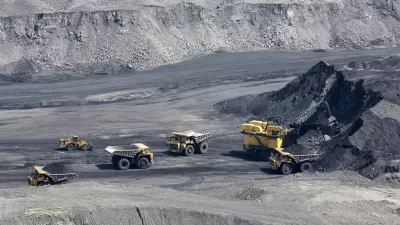Current events that have nothing to do with the environment but everything to do with politics might have caused the defeat of a bill to overturn an Obama-era rule designed to reduce methane emissions on federal lands.

A rule finalized last November by Sally Jewell, former secretary of the U.S. Department of the Interior, to "Reduce Methane Emissions & Wasted Gas on Public, Tribal Lands" for the purpose of creating a "cleaner and more sustainable energy future," will remain in place thanks to three Republican senators who chose to buck their party.
Environmentalists had targeted Republican Senators Susan Collins of Maine and Lindsey Graham of South Carolina to oppose a bill that would have overturned the rule. An unexpected "no" vote was cast by Sen. John McCain of Arizona, adding enough opposition to send the bill to defeat.
The Senate killed the bill, H.J.Res.36, with a 49-51 vote on Wednesday. In all, 46 Democrats, two Independents, and the three aforementioned Republicans voted against the resolution. It needed only 50 votes to pass after passing the House in early February on a 221-191 vote along party lines. Thursday, May 11 was the deadline to rescind rules from the prior administration using the Congressional Review Act.
David Dayen explains McCain's surprising vote for The Intercept:
Senate leaders like Mitch McConnell don’t typically advance votes on legislation unless they know it will pass. The Senate floor is almost never the scene for unexpected activity. So what happened?
It may have been Donald Trump’s firing of James Comey......
“When you fire probably, arguably, the most respected person in America, you’d better have a very good explanation, and so far I haven’t seen that,” McCain said. He added that the firing would cause legislative problems.
Three key Republican Senators came together to kill off one of Trump’s favorite pieces of legislation, in what may or may not be a sign that they’re now prepared to use the Senate to shut him down.
McCain and Graham are not exactly known as environmentalists. And yet they chose this bill to suddenly take a stand against a Donald Trump-backed piece of legislation, and they did it just one day after Trump fired James Comey.
About the rule and the Congressional Review Act
"The rule would force oil and gas companies to capture methane that had been previously burned off or 'flared' at drilling sites," report for The Washington Post.
According to federal estimates, the rule would prevent roughly 180,000 tons a year of methane from escaping into the atmosphere and would boost federal revenue between $3 million and $13 million a year because firms only pay royalties on the oil and gas they capture and contain.
"The vote marked the first time since Trump’s election that Republicans have failed in their attempt to use the Congressional Review Act to overturn Obama-era rules. Thirteen other resolutions, based on the 1996 law that allows Congress to overturn rules within 60 legislative workdays of their adoption, have succeeded.
Two other "no" votes were noteworthy, add Elperin and Harvey.
Two Democrats who had considered backing the rule’s elimination — Heidi Heitkamp of North Dakota and Joe Manchin III of West Virginia — voted against the motion, and sent a letter [pdf] asking Interior Secretary Ryan Zinke to make it less burdensome.
Environmental and public health groups ran a vigorous campaign targeting them and centrist Republicans to oppose the rule rollback. Mark Hand of Think Progress captures many of their positive reactions to the defeat of the resolution.
Related in Planetizen:
-
Energy and Environmental Regulations Under Attack—by Congress, February 2, 2017Two environmental regulations enacted by the Obama Administration are expected to be rescinded under the Congressional Review Act: the Stream Protection Rule that protects water from mountaintop coal mining and limits on flaring methane emissions.
FULL STORY: Senate unexpectedly rejects bid to repeal a key Obama-era environmental regulation

Maui's Vacation Rental Debate Turns Ugly
Verbal attacks, misinformation campaigns and fistfights plague a high-stakes debate to convert thousands of vacation rentals into long-term housing.

Planetizen Federal Action Tracker
A weekly monitor of how Trump’s orders and actions are impacting planners and planning in America.

Chicago’s Ghost Rails
Just beneath the surface of the modern city lie the remnants of its expansive early 20th-century streetcar system.

Bend, Oregon Zoning Reforms Prioritize Small-Scale Housing
The city altered its zoning code to allow multi-family housing and eliminated parking mandates citywide.

Amtrak Cutting Jobs, Funding to High-Speed Rail
The agency plans to cut 10 percent of its workforce and has confirmed it will not fund new high-speed rail projects.

LA Denies Basic Services to Unhoused Residents
The city has repeatedly failed to respond to requests for trash pickup at encampment sites, and eliminated a program that provided mobile showers and toilets.
Urban Design for Planners 1: Software Tools
This six-course series explores essential urban design concepts using open source software and equips planners with the tools they need to participate fully in the urban design process.
Planning for Universal Design
Learn the tools for implementing Universal Design in planning regulations.
planning NEXT
Appalachian Highlands Housing Partners
Mpact (founded as Rail~Volution)
City of Camden Redevelopment Agency
City of Astoria
City of Portland
City of Laramie




























